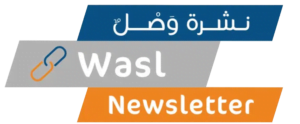A non-periodical newsletter issued by Technology and Law Community “Masaar” on news and activities related to digital rights.

The Launch of the Arab Alliance for Digital Rights

The Alliance announced the launch of its activities and its work to promote and defend the digital rights and freedoms of internet users across the Arabic-speaking countries. AADR supports users’ efforts to use the internet as a means to organize and self-advocate for their digital rights.
AADR was founded by a network of digital rights organizations from a number of Arabic-speaking countries, who came together as a community, to protect civic space online. The Jordan Open Source Society – JOSA (Jordan), the Iraqi Network for Social Media – INSM (Iraq), the Arab Center for the Advancement of Social Media – “7amleh” (Palestine), SMEX , and Technology and Law Community – “Masaar” (Egypt) each contributed to the establishment of this movement.
The Alliance’s primary initiative is to advocate for Internet policies that reflect the Arabic-Speaking region region’s complex social and political circumstances and urge individuals, groups, and companies to better adopt human rights norms online.
Contact the Alliance and follow its activities on:
Bread&Net is accepting submissions for the fourth edition of the forum

The fourth edition of Bread & Net forum will be held from 24 to 26 November, 2021. Masaar – Technology and Law Community is one of the partners supporting the forum which is organized by Social Media Exchange – SMEX.
Proposal submissions can be sent until 18 August 2021. Bread&Net themes seek to capture the challenges facing the Arabic-speaking countries, build on the progress that has already been made, and discuss where we go next. The themes are as follows:
- Policy Advocacy in Difficult Contexts
- Digital Security in Practice
- Resistance Communities
- Technology as Resource
Related links: Submit a proposal | Bread&Net website | SMEX website
Masaar – Technology and Law Community Activities
1. The Crisis of the Absence of Constitutional Protection for Press Websites
Most of the research dealing with the conditions of press freedom in Egypt in general, and the legal position of press websites in particular, focused on the laws and executive regulations that regulate the work of these platforms. But, it neglects an important aspect on the basis of the legal differentiation between print media and electronic media, which is the distinction in constitutional protection between these two types of press, and how the constitutional legislator viewed electronic press and the Internet in general during the discussion of the 2014 constitution. This study dealt with the right to issue between the print media and electronic media, the freedom of publication and imposing censorship on press websites.
Link for the study: In Arabic
2. Privacy and Security Options in Smartphones (Android and iOS)
Users rely on smartphone applications daily to accomplish their personal and professional tasks and communicate with others, and users – usually- keep personal files and data on their phones, whether they are pictures and videos or other information and data.
All data, information and files on our smartphones will be at risk in the event that the phone is lost or we are targeted, so the use of the multiple options provided by smartphone systems to protect security and privacy limits the amount of damage resulting from targeting or loss of the phone.
This guide covers the privacy and security options available in smartphones running the Android operating system (Android version 11) and smartphones running the iOS (version 14.4.2) operating system.
Link for the guide: In English | In Arabic
3. Blocking Websites in Egypt “Techniques and Laws”
This report focuses on the practice of censoring websites through blocking them in Egypt. First, the report presents the relevant legal environment, including the confirmation of the Egyptian judiciary to judicial precedents allowing websites to be blocked, and laws containing articles that allow the authorities to exercise blocking, such as Anti–Terrorism Law No. 94 of 2015, and the Anti-Cyber and Information Technology Crimes Law and the Press and Media Regulation Law.
The second section of the report deals with explaining website blocking tactics, such as IP blocking, Internet Protocol (TCP / IP) packet, blocking based on domain name system (DNS) blocking, and Deep packet inspection.
Link for the report: In English | In Arabic
4. The Right to Privacy in Egyptian Laws.. Legislative Obstacles and Unfinished Steps
Alongside the development of daily practices carried out by successive governments and service providers which violate the right to privacy, some say that most of these practices take place outside the framework of the law. However, practices associated with violating the right to privacy, which this paper will attempt to address, are not outside the law, but are rather reinforced by the law itself through the adoption of unclear vague texts by the legislator which adopt a narrow concept of the right to privacy; a right emptied of its content.
So, this study aims to shed some light on some of the common characters and features in a number of legislations that constitute major obstacles and have to be reviewed to ensure that the privacy of individuals is protected.
Link for the study: In English | In Arabic
5. Anti-Cyber and Information Technolgy Crimes Law Guide
This guide aims to raise awareness about the risks arising from the expansion of the application of the Anti-Cyber and Information Technology Crimes Law, through direct reading of the texts of the Law No. 175 of 2018, and its Executive Regulations No. 1669 of 2020. The guide depends on the interpretation of some of its texts through recent judicial applications of the law, and the practical practices by various law enforcement agencies when applying the law.
Link for the guide: In Arabic
New at “CONNECT”, on Masaar Website
Articles
1. How to Choose Secure Smartphone Applications?| Link for the article: In English | In Arabic
2. The Crime of Creating Fabricated Accounts and its Relation to Satirical Accounts and Fake Accounts | Link for the article: In Arabic
3. An Introduction to the Concept of Digital Forensic Evidence | Link for the article: In Arabic
4. NSO isn’t the Only One: Candiru, an Israeli Company Offering Spyware Systems for Oppressive Regimes | Link for the article: In English | In Arabic
5. The Story of Bitcoin and Blockchain Technology | Link for the article: In English | In Arabic
Podcast Episodes
- Episode (2): Digital security, identifying risks and choosing passwords
Link for the podcast: Google Podcasts | Apple Podcasts | Anchor | Masaar Website
- Episode (3): Digital Security, Choosing Secure Applications and Software
Link for the podcast: Google Podcasts | Apple Podcasts | Anchor | Masaar Website
- Episode (4): Licensing News Websites.. What Does Media and Press Regulation Law Tell Us?
Link for the podcast: Google Podcasts | Apple Podcasts | Anchor | Masaar Website
- Episode (5): Joy and the Inspiring Mirror.. How Can Algorithms Be Racist?
Link for the podcast: Google Podcasts | Apple Podcasts | Anchor | Masaar Website
- Episode (6): Racist Data.. How Artificial Intelligence Programs Can be Biased?
Link for the podcast: Google Podcasts | Apple Podcasts | Anchor | Masaar Website
From the Arab Region
- SMEX published a set of digital security tips entitled “How to Protect Your Data from Israeli NSO’s Surveillance Attacks?”. These tips can help counteract NSO attacks. Link for the article: In English | In Arabic
- SMEX has also published a report on Covid-19 and social control in Lebanon, this report aims to assess the government’s pandemic response, and the ways it has affected social control and social exclusion, with a particular focus on Ma3an and other electronic platforms the government has launched. Link for the report: In English | In Arabic
- “Decentralization from an Interdisciplinary Perspective” is a 3-part series of articles published in Arabic by the Jordan Open Source Association. The articles deal with “Decentralization as a Network Topology“, “Drivers of Decentralization across Disciplines“, and “A Critical Look at Decentralization“.
- The Jordan Open Source Association has also published a series of articles in Arabic under the title “A Look at Password Security”. The series consists of 3 parts, the first part is “History and Background“, the second is “Websites“, and the third is “More Secure Login Protocols“.
- 7amleh – The Arab Center for the Advancement of Social Media, published a report entitled “The Attacks on Palestinian Digital Rights”. The report is based on reports of digital rights violations from 6 to 19 May, 2021, during the recent Israeli attack on Palestinians. Link for the report: In English | In Arabic
Daraj, an independent digital media platform, published a number of articles about “Pegasus Leaks” and the Israeli NSO, which helped ten countries to wiretap 50,000 phones of politicians, activists, dissidents, journalists, businessmen, human rights defenders and diplomats. Link for the article: In English | In Arabic
Press Releases
- The Pegasus Project: MENA Surveillance Coalition demands an end to the sale of surveillance technology to the region’s autocratic governments
Middle East and North Africa Coalition to Combat Digital Surveillance, called for an immediate halt to the use, sale and transfer of surveillance technology to autocratic oppressive governments across the Middle East and North Africa (MENA). In light of revelations exposing the staggering scale of surveillance targeted at human rights defenders including journalists, bloggers and Internet activists facilitated by Israeli NSO Group’s Pegasus spyware, based in Israel, the organizations urged all states to enforce a moratorium until a clear human rights regulatory framework is established.
Link for the press release: In English | In Arabic
- Egyptian rights organizations demand an end to Israel’s attacks and apartheid
A number of Egyptian human rights organizations condemned the violent incidents in the occupied Palestinian territories (East Jerusalem). The organizations added that the evictions carried out by the Israeli authorities in Sheikh Jarrah and other old neighborhoods in East Jerusalem are a clear and explicit violation of international law, which may amount to war crimes, as explained by the spokesperson for the United Nations High Commissioner for Human Rights, Rupert Colville.
Link for the press release: In English | In Arabic
